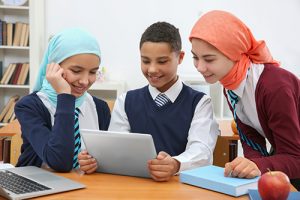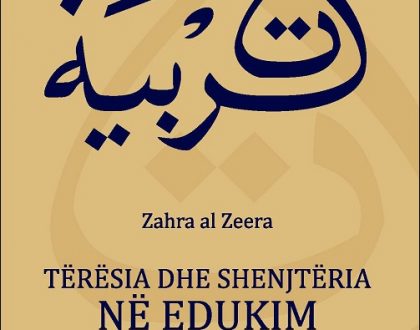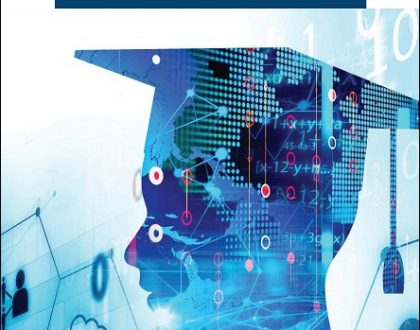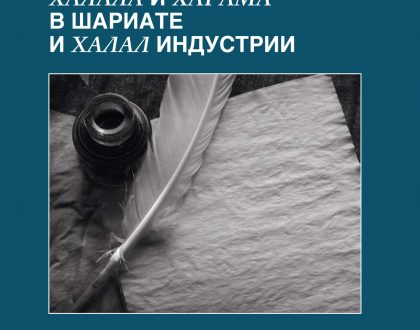Implementing Values-Based Education in Muslim Societies

By: Lauren Erickson
Within our ever-changing world, the importance of teaching 21st century skills cannot be overstated. We need to develop individuals who respect diversity and cultural values while contributing to their communities, whether local or national, through the 4 C’s: critical thinking, creativity, collaboration, and communication (IDEAS, 2019; Stauffer, 2020). The 4 C’s represent the framework for 21st century skills needed to thrive in a global economy and competitive international education systems; these skills are especially relevant in the context of education reform that has been occurring within Muslim societies. In that regard, values-based education is an important tool for implementing these skills effectively in an institutional setting.
Values-based education is an approach focused on integrating basic human principles into current school curricula, such as respect, justice, integrity, harmony, trust, and honesty (VbE, 2020). This is essential to the strengthening of education reform efforts to improve greater opportunities for jobs, equal gender representation, and economic stability. Within Muslim societies, this entails practicing and developing “good character and professional skills” within schools while “still maintaining the fundamental institutional orientation of producing graduates with competency in Islamic [religious] knowledge” (Hashim & Jemali, 2017, p. 55). To illustrate the benefits of values-based education, two contemporary values-based case studies will be explored here: the implementation of a Self-Development Course (SDC) in a Malaysian university and the use of teacher humor in Iraqi preparatory schools. Both of these studies produce the positive side effects of respect, trust, and honesty, as well as the 4 C’s.
Hassan et al. (2015) conducted a study on the SDC, an elective at Universiti Kebangsaan in Malaysia, which utilizes a forum to equip students with soft skills, such as information management, teamwork, and lifelong learning. The forum is discussion-based, exercises academic accountability among students, and works through various presentation mediums, like jokes and videos, to teach numerous concepts (Hassan et al., 2015). The authors of the study elaborate that it is primarily centered around “expressing … thoughts and linking the theories of self development with current issues” (p. 91). Majority of the students believed the forum could “develop further student creativity, increase their problem-solving skills and enhance [the] ability to deal with current issues effectively” (p. 93). Through the forum, students not only improved skills such as problem-solving, non-verbal communication, and information management, but they also grounded themselves more in the subject and enhanced their ability to gather and analyze information more effectively and resourcefully (Hassan et al., 2015).
The second case study, covered by AbdAli et al. (2016), focused on 5th year students at seven different preparatory schools in Iraq, a comparatively underrepresented area of research. Findings from the study concluded that “[humor]…creates good rapport between the students and teachers, thus generat[ing] a comfortable learning environment, increase[ing] motivation and comprehension as well as retention of information” (AbdAli et al., 2016, p. 56). The study additionally explains how pupils this age typically have higher levels of stress and pressure since it is such a transitional psychological period, consequently enhancing the advantages of humor-integration (AbdAli et al., 2016). These benefits show growth in the comprehension and retention of information, participation, communication skills, intrinsic motivation, and performance on creativity tests as compared to the control groups (AbdAli et al., 2016). The majority of student responses on the concluding questionnaire, according to AbdAli et al. (2016), showed a preference for the use of humor during lessons with “no statistically significant difference between students’ attitudes … in both literary and scientific sections” (p. 58).
There are a lot of similarities between the two studies. In the SDC, opportunities for communication and collaboration provided a welcoming atmosphere of respect toward others’ thoughts, trust in one another’s academic accountability, and honesty within the context of applying self-development to human-related issues. With the implementation of the Teacher Humor program, respect was established out of teachers’ ability to educate meaningfully, trust became apparent through an increase in relatability, and the continuous use of humor provided a “safety blanket” students could rely on to preserve individual honor if disagreements or corrections arose. What’s even more impressive is how both of these values-based approaches continued to practice critical thinking, creativity, collaboration, and communication between teachers and peers.
The use of values-based education in both the Malaysian SDC and teachers’ use of humor in Iraqi preparatory schools have a direct link to the development of necessary 21st century skills needed for survival in today’s rapidly evolving world. Not only do they each promote a student-centered approach, they showcase effective strategies that can positively influence education reforms in Muslim societies.
Bio: Lauren, a graduate student at Loyola University Chicago, is studying Cultural and Educational Policy. She has experience working as an elementary teacher at a project-based school. Her academic interests include education reform and comparative education.
References
AbdAli, A., Ashur, N., Ghazi, L., & Muslim, A. (2016). Measuring Students’ Attitudes Towards Teachers’ Use of Humour During Lessons: A Questionnaire Study. Journal of Education and Practice, 7(35), 52–58. Educational Resources Information Center. https://files.eric.ed.gov/fulltext/EJ1126486.pdf
Hassan, W., Jamsari, E. A., Taha, M., Basir, A., Alias, jamsari, & Muslim, N. (2015). Effectiveness of the Forum Method for the Self Development Course in UKM and Its Link with Student Interest. Turkish Online Journal of Distance Education, 16(3), 88–96. Educational Resources Information Center. https://files.eric.ed.gov/fulltext/EJ1092849.pdf
Hashim, I., Jemali, M. (2017). Key Aspects of Current Educational Reforms in Islamic Educational Schools. Global Journal Al-Thaqafah. https://www.researchgate.net/publication/318787008_
Key_Aspects_of_Current_Educational_Reforms_in_Islamic_Educational_Schools/citation/download
IDEAS for Global Citizenship – What is Global Citizenship? (2019). Ideas-Forum.Org.Uk. http://www.ideas-forum.org.uk/about-us/global-citizenship
Stauffer, B. (2020, May 7). What Are the 4 C’s of 21st Century Skills? Www.Aeseducation.Com. https://www.aeseducation.com/blog/four-cs-21st-century-skills
Values-based Education. (2020). What Is VbE? Valuesbasededucation.Com. https://valuesbasededucation.com/
Recommended Posts

Wholeness And Holiness – Albanian translation
December 28, 2020

The Power of Education – Albanian translation
December 28, 2020

